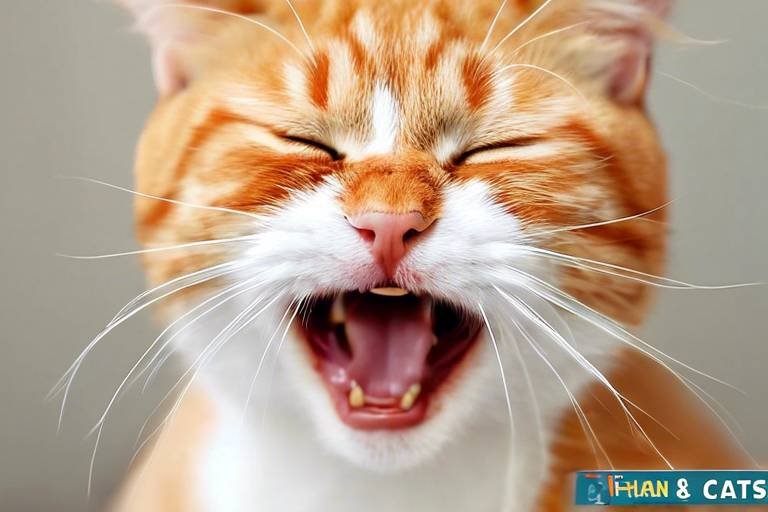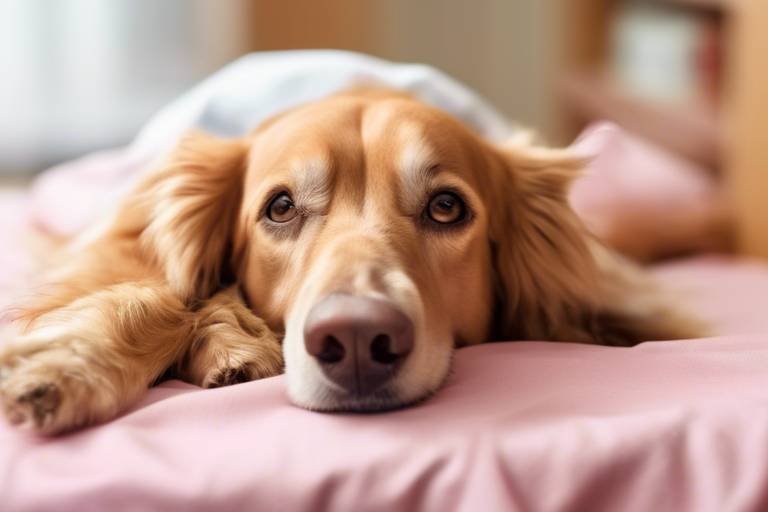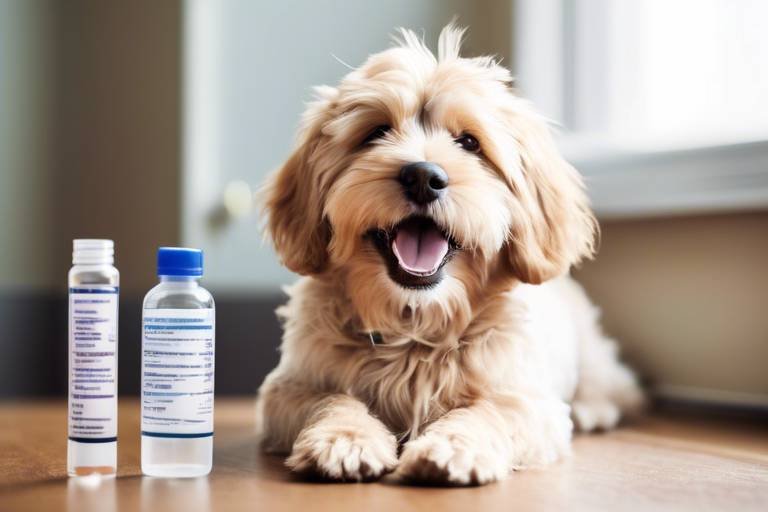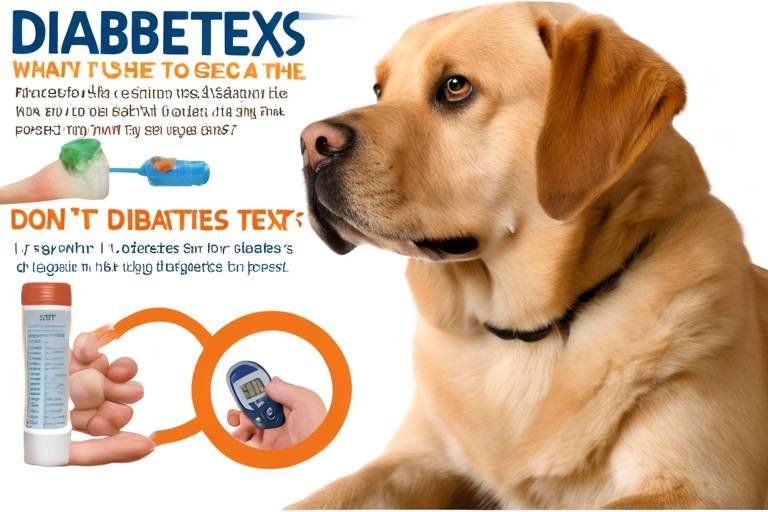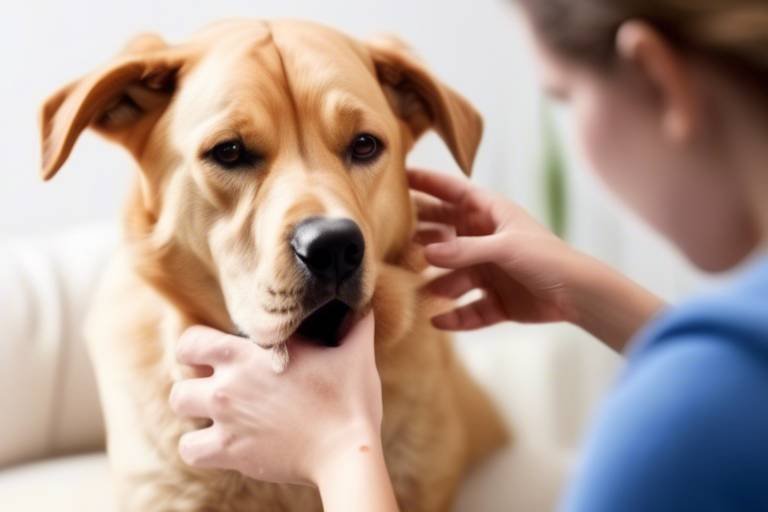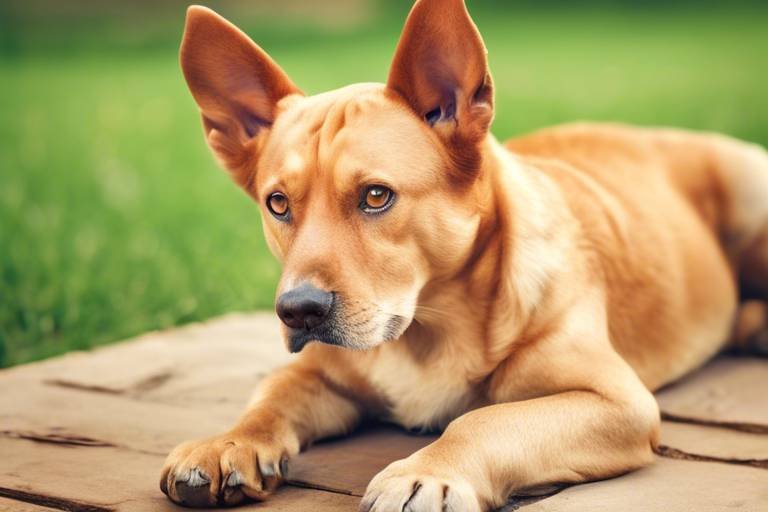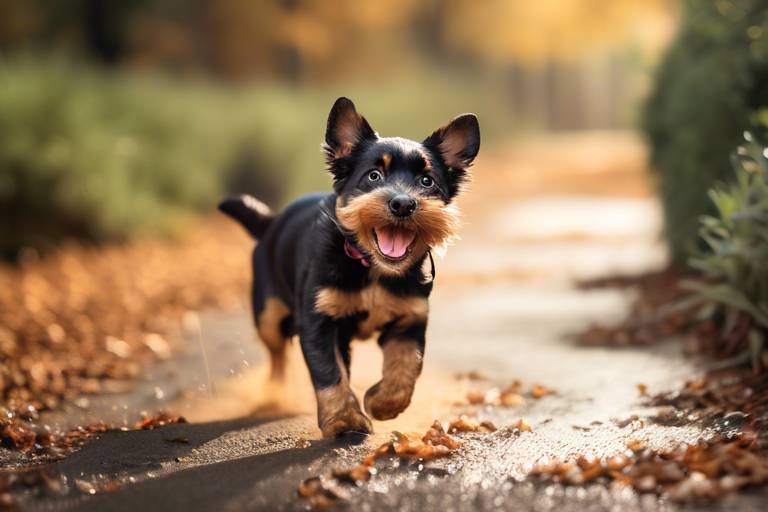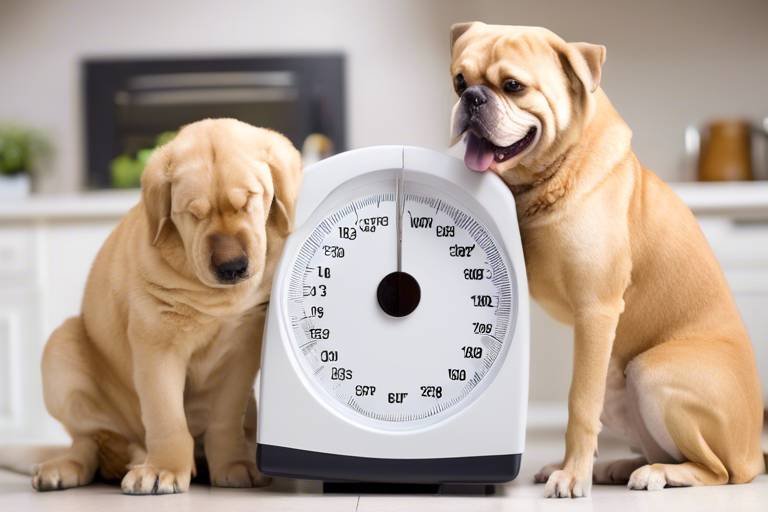Signs of Gastrointestinal Issues in Pets
As pet owners, we cherish our furry friends and want nothing but the best for them. However, just like us, pets can experience gastrointestinal issues that can significantly affect their health and well-being. Recognizing the signs of these problems early on is crucial, as it allows us to seek appropriate veterinary care before things escalate. Imagine your pet as a delicate flower; if you notice the petals wilting, it's time to investigate what might be wrong. This article explores the common signs of gastrointestinal distress in pets, ensuring you’re equipped to act swiftly if your companion shows any symptoms.
Recognizing the early signs of gastrointestinal distress in pets is crucial for their health. Symptoms such as vomiting, diarrhea, and changes in appetite can indicate underlying health issues that require prompt attention. Think of these symptoms as warning lights on your car's dashboard. Ignoring them could lead to a much bigger problem down the road. If you notice any of these signs, it’s essential to take them seriously and consult your veterinarian. Here are some common symptoms to keep an eye on:
- Vomiting: Frequent or severe vomiting can indicate a serious issue.
- Diarrhea: Loose stools can lead to dehydration and should be monitored closely.
- Changes in Appetite: A sudden increase or decrease in your pet’s appetite can signal distress.
Vomiting is one of the most frequent symptoms of gastrointestinal issues in pets. It’s like a red flag waving in the wind, signaling that something isn’t quite right. Understanding the various causes of vomiting, from dietary indiscretion to more serious conditions, can help pet owners respond effectively. For instance, if your pet has gotten into the trash again, it might just be a case of eating something they shouldn’t have. However, if vomiting persists, it could indicate a more serious underlying health issue.
Differentiating between acute and chronic vomiting is essential for diagnosis. Acute vomiting may be temporary, often resolving on its own. On the other hand, chronic vomiting can indicate ongoing health problems that need veterinary evaluation. Think of acute vomiting as a passing storm, while chronic vomiting is more like a prolonged drought—both need attention, but the latter requires a more in-depth look.
Certain foods can trigger vomiting in pets. Identifying dietary sensitivities or allergies is vital for preventing future episodes and ensuring your pet's well-being. This might mean switching to a different brand of food or avoiding specific ingredients altogether. Always remember, your pet’s diet is like the foundation of a house; if it’s unstable, everything else can come crashing down.
Chronic vomiting may signal serious health issues such as liver disease or pancreatitis. Regular veterinary check-ups can help catch these conditions early. It’s always better to be safe than sorry, so don’t hesitate to schedule a visit if your pet’s vomiting becomes a concern.
Diarrhea is another common sign of gastrointestinal problems. It can lead to dehydration and other complications if not addressed promptly. Think of diarrhea as a leaky faucet; if left unattended, it can cause significant damage over time. If your pet experiences diarrhea, especially if it lasts more than a day, it’s time to take action.
A sudden change in appetite or weight can indicate gastrointestinal distress. Monitoring your pet's eating habits is essential for early detection of potential issues. Just like we notice when our friends seem off, your pet's eating patterns can tell you a lot about their health. If you see your pet turning their nose up at food they usually love, don’t ignore it.
A significant decrease in appetite may suggest nausea or other gastrointestinal problems. Pet owners should be vigilant and consult a veterinarian if this persists. It’s important to remember that a loss of appetite can be a sign of something serious, and you should never wait too long to seek help.
Unexplained weight loss in pets can be alarming and often points to underlying health issues, including gastrointestinal disorders. Regular monitoring can help identify these concerns early. Just like we keep an eye on our own weight, it’s crucial to track your pet’s weight as well. A sudden drop can be a cry for help!
Changes in behavior, such as lethargy or irritability, can also signal gastrointestinal issues. Observing your pet's behavior can provide crucial clues to their health status. If your usually playful pup is suddenly lethargic, it’s time to investigate. Pets can’t tell us what’s wrong, but their behavior often speaks volumes.
Pets may show signs of discomfort, such as pacing or whining, when experiencing gastrointestinal distress. Recognizing these signs can prompt timely veterinary attention. Think of your pet as a little detective; they might not be able to speak, but their actions can reveal a lot about what they’re feeling.
Increased thirst or urination may accompany gastrointestinal issues, particularly if dehydration is present. Monitoring these changes can help ensure your pet remains hydrated and healthy. Just like a plant needs water to thrive, your pet needs proper hydration to stay healthy. If you notice they’re drinking more than usual, it’s worth a call to the vet.
Q: What should I do if my pet is vomiting?
A: If your pet is vomiting, monitor the frequency and severity. If it persists for more than a few hours or is accompanied by other symptoms, consult your veterinarian.
Q: How can I tell if my pet is dehydrated?
A: Signs of dehydration include dry gums, lethargy, and decreased skin elasticity. If you suspect dehydration, contact your veterinarian immediately.
Q: Is a loss of appetite always a bad sign?
A: Not always, but it can indicate underlying issues. If your pet refuses food for more than 24 hours, it’s best to consult a veterinarian.
Q: How often should I take my pet for a check-up?
A: Regular check-ups are recommended at least once a year, but more frequent visits may be necessary for older pets or those with existing health issues.

Common Symptoms to Watch For
This article explores common signs of gastrointestinal issues in pets, helping pet owners identify potential health problems early and seek appropriate veterinary care for their furry companions.
Recognizing the early signs of gastrointestinal distress in pets is crucial. Just like we humans can feel off when our stomachs are upset, pets can show various symptoms that signal something isn’t right. Vomiting, diarrhea, and changes in appetite are some of the most common indicators that your furry friend might be experiencing gastrointestinal issues. These symptoms can be the tip of the iceberg, hinting at underlying health problems that require prompt attention. Imagine your pet as a little detective, trying to communicate that something is wrong. The sooner you can decode their signals, the better chance you have of ensuring their health and happiness.
For instance, if your pet suddenly starts vomiting, it can be alarming. But don't panic just yet! It’s essential to observe how often it happens and if there are any other accompanying symptoms. A single episode might not be cause for concern, but if it becomes a recurring issue, it’s time to consult the vet. Similarly, diarrhea isn’t just a messy inconvenience; it can lead to dehydration and other complications if not addressed promptly. Think of it as your pet’s way of sending out an SOS signal that something is amiss in their digestive system.
In addition to vomiting and diarrhea, pay close attention to any changes in your pet’s appetite. Is your usually ravenous dog suddenly picking at their food? Or is your cat turning up their nose at their favorite treats? A sudden change in appetite can indicate gastrointestinal distress or even other health issues. Monitoring your pet's eating habits is essential for early detection of potential problems. Remember, a healthy pet is a happy pet, and being proactive can save you from a lot of worry down the line.
Lastly, don’t overlook the importance of behavioral changes. If your pet seems lethargic, irritable, or just not themselves, it could be a sign that they’re feeling unwell. Pets often hide their discomfort, so being attentive to their behavior can provide crucial clues to their health status. Think of your pet as your little buddy who can’t quite tell you what’s wrong. By observing these signs, you can take the necessary steps to ensure they get the care they need.
- What should I do if my pet is vomiting? If your pet vomits once but seems otherwise fine, monitor them closely. However, if vomiting persists or is accompanied by other symptoms, contact your veterinarian.
- How can I tell if my pet is dehydrated? Signs of dehydration include dry gums, excessive thirst, and lethargy. If you suspect dehydration, consult your vet immediately.
- Are there specific foods that can cause gastrointestinal issues? Yes, certain foods, particularly those that are rich in fat or contain allergens, can trigger gastrointestinal problems. Always introduce new foods gradually.
- How often should I monitor my pet's weight? Regular weight checks should be part of your routine, ideally every month, to catch any sudden changes that could indicate health issues.
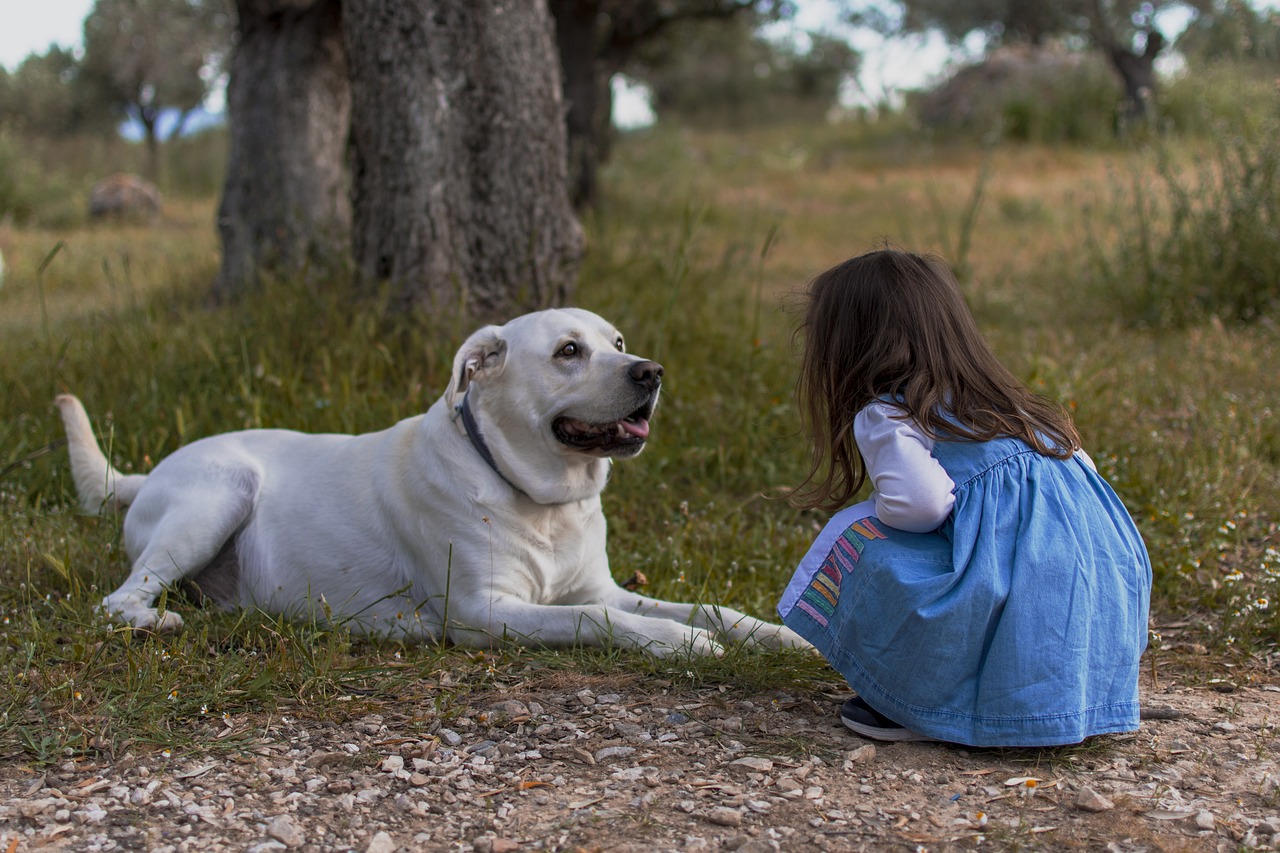
Vomiting: Causes and Implications
Vomiting is a common yet distressing symptom that can indicate a range of gastrointestinal issues in pets. As pet owners, it’s essential to understand that while occasional vomiting may not be a cause for alarm, frequent or severe vomiting can signal more serious health problems. Think of your pet's stomach as a delicate ecosystem; when something disrupts the balance, it can lead to chaos. Understanding the causes of vomiting can help you respond effectively and ensure your furry friend gets the care they need.
There are several potential causes of vomiting in pets, ranging from minor irritations to severe health conditions. For instance, dietary indiscretion is a frequent culprit—pets are notorious for snacking on things they shouldn't, whether it's a dropped piece of food or something even more questionable found on a walk. However, it’s not just about what they eat. Other factors, such as stress, infections, or even toxins, can lead to vomiting episodes. Here are some common causes:
- Dietary Indiscretion: Eating spoiled food or non-food items can irritate the stomach.
- Infections: Bacterial or viral infections can disrupt the digestive system.
- Internal Parasites: Worm infestations can lead to vomiting as the body tries to expel them.
- Chronic Conditions: Issues such as kidney disease or pancreatitis require immediate veterinary attention.
Understanding the difference between acute and chronic vomiting is also crucial. Acute vomiting is often a sudden occurrence and may resolve on its own, while chronic vomiting persists over time, indicating a more serious underlying issue. For example, if your pet vomits once after eating grass, it might not be a concern. But if your pet is vomiting multiple times a week, it’s time to consult your veterinarian. This distinction is vital for diagnosis and treatment, as chronic vomiting can lead to severe dehydration and other complications if left unaddressed.
Dietary factors play a significant role in vomiting. Some pets may develop sensitivities or allergies to certain ingredients, leading to gastrointestinal upset. Identifying these triggers is essential. Keeping a food diary can help you track what your pet eats and when they vomit, providing valuable information for your veterinarian. On the other hand, chronic vomiting can be a red flag for serious health issues such as liver disease or pancreatitis. Regular veterinary check-ups are essential for catching these conditions early and ensuring your pet remains healthy.
In summary, while vomiting can be a common occurrence in pets, it’s essential to pay attention to the frequency and severity of the episodes. Understanding the various causes and implications can help you take proactive steps in your pet's healthcare journey. If you notice any concerning symptoms, don’t hesitate to reach out to your veterinarian for guidance.
- What should I do if my pet vomits? Monitor your pet closely. If the vomiting is persistent or accompanied by other symptoms, consult your veterinarian.
- How can I prevent my pet from vomiting? Ensure they have a balanced diet, avoid giving them table scraps, and keep harmful substances out of reach.
- When should I be concerned about my pet's vomiting? If vomiting occurs more than once in a short period, if there is blood in the vomit, or if your pet shows signs of lethargy or distress, seek veterinary care immediately.
Acute vs. Chronic Vomiting
This article explores common signs of gastrointestinal issues in pets, helping pet owners identify potential health problems early and seek appropriate veterinary care for their furry companions.
Recognizing the early signs of gastrointestinal distress in pets is crucial. Symptoms like vomiting, diarrhea, and changes in appetite can indicate underlying health issues that require prompt attention.
Vomiting is a frequent symptom of gastrointestinal issues in pets. Understanding the various causes, from dietary indiscretion to more serious conditions, can help pet owners respond effectively.
Differentiating between acute and chronic vomiting is essential for diagnosis. Acute vomiting may be temporary and often resolves on its own, typically caused by things like eating something they shouldn't have or a minor stomach upset. On the other hand, chronic vomiting persists over time and can indicate ongoing health problems that need veterinary evaluation. It's like the difference between a quick storm that passes and a long, drawn-out rainy season—one is a temporary nuisance, while the other can lead to significant issues if not addressed.
To better understand the differences, consider the following:
| Type of Vomiting | Duration | Common Causes | Veterinary Attention Needed? |
|---|---|---|---|
| Acute Vomiting | Short-term (hours to days) | Dietary indiscretion, minor infections | Usually not required unless severe |
| Chronic Vomiting | Long-term (weeks to months) | Liver disease, pancreatitis, gastrointestinal tumors | Yes, immediate veterinary care required |
Understanding these distinctions can empower pet owners to take the right actions. If your pet experiences acute vomiting, it might be a good idea to monitor them closely for a day or two. However, if the vomiting is chronic, it’s crucial to consult a veterinarian as soon as possible to diagnose any serious underlying conditions.
Certain foods can trigger vomiting in pets. Identifying dietary sensitivities or allergies is vital for preventing future episodes and ensuring your pet's well-being. It's essential to keep track of what your pet eats and to introduce new foods gradually, just like you would with a new recipe—slowly and carefully to avoid any unpleasant surprises!
Chronic vomiting may signal serious health issues such as liver disease or pancreatitis. Regular veterinary check-ups can help catch these conditions early. Think of it as a routine maintenance check for your car; you wouldn't wait until it breaks down to take it to the mechanic, right? The same goes for your pet's health!
Diarrhea is another common sign of gastrointestinal problems. It can lead to dehydration and other complications if not addressed promptly.
A sudden change in appetite or weight can indicate gastrointestinal distress. Monitoring your pet's eating habits is essential for early detection of potential issues.
A significant decrease in appetite may suggest nausea or other gastrointestinal problems. Pet owners should be vigilant and consult a veterinarian if this persists.
Unexplained weight loss in pets can be alarming and often points to underlying health issues, including gastrointestinal disorders. Regular monitoring can help identify these concerns early.
Changes in behavior, such as lethargy or irritability, can also signal gastrointestinal issues. Observing your pet's behavior can provide crucial clues to their health status.
Pets may show signs of discomfort, such as pacing or whining, when experiencing gastrointestinal distress. Recognizing these signs can prompt timely veterinary attention.
Increased thirst or urination may accompany gastrointestinal issues, particularly if dehydration is present. Monitoring these changes can help ensure your pet remains hydrated and healthy.
- What should I do if my pet is vomiting? If your pet vomits once but appears otherwise healthy, monitor them for a day. If vomiting persists, contact your veterinarian.
- How can I prevent gastrointestinal issues in my pet? Feed a balanced diet, avoid table scraps, and ensure regular vet check-ups.
- When should I be concerned about diarrhea? If diarrhea lasts more than 24 hours or is accompanied by vomiting, lethargy, or blood, seek veterinary help immediately.
Dietary Factors
When it comes to our furry friends, their dietary choices can significantly impact their gastrointestinal health. Just like humans, pets can have food sensitivities or allergies that may lead to a range of gastrointestinal issues. For instance, some pets might react negatively to common ingredients like wheat, corn, or certain proteins, resulting in symptoms such as vomiting or diarrhea. It’s crucial to be observant and keep track of what your pet eats, as well as how they respond to specific foods.
Moreover, sudden changes in diet can also trigger gastrointestinal distress. If you’ve recently switched your pet’s food, it’s advisable to transition gradually over a week or so. This allows their digestive system to adjust without causing undue stress. A sudden change can be like throwing a curveball at your pet's stomach, leading to discomfort and potential health issues.
Here are some common dietary factors that can influence your pet's gastrointestinal health:
- High-fat foods: These can be particularly hard on pets' digestive systems, especially in dogs.
- Rich treats: Foods that are too rich can upset the stomach and lead to vomiting or diarrhea.
- Human food: While it might be tempting to share your meals, many human foods are not suitable for pets and can cause gastrointestinal issues.
Additionally, it’s essential to consult with your veterinarian about the best diet for your pet, especially if they have a history of gastrointestinal problems. Your vet can recommend high-quality, easily digestible foods that cater to your pet’s specific needs. Remember, what works for one pet may not work for another, so personalized dietary choices are key!
In conclusion, keeping a close eye on your pet's diet is a vital part of maintaining their gastrointestinal health. By understanding the dietary factors that can affect your pet, you can help prevent uncomfortable gastrointestinal issues and ensure that your furry companion stays happy and healthy.
Q: What are the signs that my pet has a food allergy?
A: Common signs include vomiting, diarrhea, itching, and skin irritations. If you notice any of these symptoms, consult your veterinarian.
Q: Can I give my pet table scraps?
A: While it may be tempting, many human foods can be harmful to pets. Always check with your vet before sharing your meals.
Q: How can I transition my pet to a new diet safely?
A: Gradually mix the new food with the old food over a week, increasing the new food's proportion each day to avoid gastrointestinal upset.
Q: What should I do if my pet continues to vomit or has diarrhea?
A: If symptoms persist for more than a day or two, it's crucial to seek veterinary care to rule out any serious health issues.
Underlying Health Conditions
This article explores common signs of gastrointestinal issues in pets, helping pet owners identify potential health problems early and seek appropriate veterinary care for their furry companions.
Recognizing the early signs of gastrointestinal distress in pets is crucial. Symptoms like vomiting, diarrhea, and changes in appetite can indicate underlying health issues that require prompt attention.
Vomiting is a frequent symptom of gastrointestinal issues in pets. Understanding the various causes, from dietary indiscretion to more serious conditions, can help pet owners respond effectively.
Differentiating between acute and chronic vomiting is essential for diagnosis. Acute vomiting may be temporary, while chronic vomiting can indicate ongoing health problems that need veterinary evaluation.
Certain foods can trigger vomiting in pets. Identifying dietary sensitivities or allergies is vital for preventing future episodes and ensuring your pet's well-being.
Chronic vomiting may signal serious health issues such as liver disease or pancreatitis. These underlying conditions can be insidious, often presenting with vague symptoms that can easily be overlooked by pet owners. For instance, a pet that occasionally vomits after eating may be dismissed as simply having a sensitive stomach, yet it could be a sign of a more severe problem. It's essential to understand that persistent vomiting can lead to dehydration and electrolyte imbalances, compounding the health risks for your furry friend.
Some of the critical underlying health conditions associated with gastrointestinal issues in pets include:
- Liver Disease: The liver plays a vital role in digestion and metabolism. Conditions affecting the liver can lead to symptoms such as vomiting, diarrhea, and jaundice.
- Pancreatitis: Inflammation of the pancreas can cause severe abdominal pain, vomiting, and diarrhea. This condition often requires immediate veterinary intervention.
- Intestinal Obstructions: Blockages in the intestines can prevent proper digestion and absorption of nutrients, leading to vomiting and severe discomfort.
- Gastrointestinal Tumors: While less common, tumors in the gastrointestinal tract can lead to chronic vomiting, weight loss, and changes in appetite.
Regular veterinary check-ups can help catch these conditions early. Your veterinarian may recommend diagnostic tests such as blood work, ultrasound, or X-rays to determine the underlying cause of your pet's gastrointestinal symptoms. By being proactive and attentive to your pet's health, you can increase the chances of early detection and treatment, ultimately leading to a better quality of life for your beloved companion.
Diarrhea is another common sign of gastrointestinal problems. It can lead to dehydration and other complications if not addressed promptly.
A sudden change in appetite or weight can indicate gastrointestinal distress. Monitoring your pet's eating habits is essential for early detection of potential issues.
A significant decrease in appetite may suggest nausea or other gastrointestinal problems. Pet owners should be vigilant and consult a veterinarian if this persists.
Unexplained weight loss in pets can be alarming and often points to underlying health issues, including gastrointestinal disorders. Regular monitoring can help identify these concerns early.
Changes in behavior, such as lethargy or irritability, can also signal gastrointestinal issues. Observing your pet's behavior can provide crucial clues to their health status.
Pets may show signs of discomfort, such as pacing or whining, when experiencing gastrointestinal distress. Recognizing these signs can prompt timely veterinary attention.
Increased thirst or urination may accompany gastrointestinal issues, particularly if dehydration is present. Monitoring these changes can help ensure your pet remains hydrated and healthy.
Q: What should I do if my pet is vomiting?
A: If your pet is vomiting, monitor their condition closely. If vomiting persists for more than 24 hours or is accompanied by other symptoms like lethargy or diarrhea, consult your veterinarian immediately.
Q: How can I prevent gastrointestinal issues in my pet?
A: To prevent gastrointestinal problems, ensure your pet has a balanced diet, avoid sudden food changes, and keep harmful substances out of reach. Regular veterinary check-ups are also essential.
Q: When should I be concerned about my pet's appetite?
A: If your pet has a significant decrease in appetite lasting more than a day or shows other signs of distress, such as vomiting or lethargy, consult your veterinarian.
Q: Can stress cause gastrointestinal issues in pets?
A: Yes, stress can lead to gastrointestinal problems in pets. Changes in environment, routine, or the introduction of new pets can trigger these issues.
Diarrhea: Understanding the Risks
Diarrhea in pets is more than just an inconvenience; it can be a serious health concern. When your furry friend experiences loose or watery stools, it's essential to understand the potential risks involved. Diarrhea can lead to dehydration, which is particularly dangerous for pets, especially if it persists for more than a day. Just like a car running on empty, a pet without enough fluids can quickly become lethargic and unwell.
There are various causes of diarrhea in pets, ranging from mild dietary indiscretions to severe infections. For instance, if your pet has gotten into the trash or snuck a bite of something off the table, it could simply be a case of upset stomach. However, if the diarrhea is accompanied by other symptoms like vomiting, fever, or lethargy, it may indicate a more serious issue that requires immediate veterinary attention.
It's crucial for pet owners to monitor their pets closely during episodes of diarrhea. Here are some key points to keep in mind:
- Duration: If diarrhea lasts more than 24 hours, it's time to consult a veterinarian.
- Consistency: Watery stools are more concerning than soft stools; the former can lead to rapid dehydration.
- Accompanying Symptoms: Watch for signs of vomiting, blood in stools, or any unusual behavior, as these can indicate serious conditions.
To help prevent diarrhea, consider the following tips:
- Maintain a consistent diet and avoid sudden changes in food.
- Ensure your pet does not have access to garbage or harmful food items.
- Keep up with regular veterinary check-ups to monitor your pet's overall health.
In summary, while diarrhea might seem like a minor issue, it can escalate quickly if not addressed. Staying vigilant and proactive about your pet's health can make all the difference. If in doubt, don’t hesitate to reach out to your vet; after all, a healthy pet means a happy pet!
Q: What should I do if my pet has diarrhea?
A: If your pet has diarrhea, monitor them closely for other symptoms. Ensure they have access to fresh water to prevent dehydration. If diarrhea persists for more than 24 hours or is accompanied by vomiting, lethargy, or blood, contact your veterinarian.
Q: Can I give my pet over-the-counter medications for diarrhea?
A: It's best to consult your veterinarian before administering any medications. Some human medications can be harmful to pets, and your vet can recommend safe alternatives if needed.
Q: How can I prevent diarrhea in my pet?
A: To prevent diarrhea, maintain a consistent diet, avoid sudden changes in food, and keep harmful items out of reach. Regular veterinary check-ups can also help catch any underlying health issues early.

Changes in Appetite and Weight
When it comes to our beloved pets, changes in appetite and weight can be some of the most telling signs of underlying gastrointestinal issues. Just like how we might feel off when we're not eating right, our furry friends can exhibit similar behaviors. A sudden spike or drop in their food intake can indicate that something is amiss. For instance, if your pet suddenly turns up their nose at their favorite kibble, it could be a sign of nausea or discomfort. Conversely, if they are ravenously hungry all the time, it might suggest that their body is not absorbing nutrients properly. It's essential to keep an eye on these changes because they can lead to significant health concerns if left unaddressed.
Weight fluctuations can also be alarming. A noticeable weight loss can often be a red flag, pointing to issues such as gastrointestinal disorders or even more severe conditions like cancer. Imagine if you suddenly started losing weight without trying; you’d likely be concerned! The same goes for our pets. Regular weigh-ins can help you catch these changes early. If you notice that your pet is losing weight, it’s crucial to consult with your veterinarian as soon as possible. They can help determine whether the weight loss is due to a gastrointestinal issue or another health problem.
On the flip side, weight gain can also be a concern. If your pet is gaining weight unexpectedly, it could be due to overeating, but it might also indicate that they are consuming more food in an attempt to compensate for poor nutrient absorption. In such cases, even though they may seem to be eating well, their bodies could be struggling to process what they're consuming effectively. Keeping track of your pet's eating habits and weight can provide valuable insights into their health.
To help you monitor these changes more effectively, consider maintaining a pet health journal. This can include:
- Daily food intake
- Weight measurements
- Behavioral observations
By documenting these factors, you can provide your veterinarian with detailed information that can aid in diagnosis and treatment. Remember, our pets rely on us to notice when something isn't quite right. Being proactive about changes in appetite and weight can make a world of difference in their health and happiness.
Q: What should I do if my pet suddenly stops eating?
A: If your pet stops eating for more than 24 hours, it's essential to consult your veterinarian. It could be a sign of a serious health issue.
Q: How can I tell if my pet is losing weight?
A: Regular weigh-ins are the best way to monitor your pet's weight. You can also check for visible signs, such as a more prominent ribcage or a sagging belly.
Q: Is it normal for pets to have fluctuations in appetite?
A: While some fluctuations can be normal, significant or sudden changes in appetite should be evaluated by a veterinarian.
Q: What are some common gastrointestinal issues in pets?
A: Common issues include food allergies, infections, parasites, and more severe conditions like pancreatitis or liver disease.
Loss of Appetite
When your furry friend suddenly turns up their nose at dinner, it can be a cause for concern. A in pets is often one of the first signs that something might be amiss in their gastrointestinal system. Just like us, pets can experience nausea or discomfort that makes them less interested in food. But why does this happen? Well, there are several reasons, and understanding them can help you take the right steps to ensure your pet's health.
First and foremost, it's important to recognize that a decreased appetite can be a symptom of various underlying issues. For instance, gastrointestinal problems can lead to nausea, making your pet reluctant to eat. Additionally, dental issues, infections, or even stress can contribute to this behavior. If your pet is usually a food enthusiast and suddenly decides to skip meals, it’s time to pay closer attention.
Here are a few common causes of loss of appetite in pets:
- Gastrointestinal Distress: Conditions like gastritis or pancreatitis can lead to significant discomfort, causing your pet to avoid food.
- Dental Problems: Painful teeth or gums can make eating uncomfortable, leading to a decrease in appetite.
- Infections: Bacterial or viral infections can result in nausea, which might deter your pet from eating.
- Stress or Anxiety: Changes in the environment, such as moving to a new home or the introduction of a new pet, can impact your pet's eating habits.
It's crucial to monitor how long this loss of appetite persists. If your pet refuses to eat for more than 24 hours, it's recommended to consult a veterinarian. They can help determine the underlying cause and provide appropriate treatment. In some cases, a temporary loss of appetite might not be serious, but it can also indicate a more significant health issue that needs addressing.
In the meantime, you can encourage your pet to eat by trying different strategies. For example, warming their food slightly can enhance the aroma, making it more appealing. You might also consider offering bland foods, like boiled chicken and rice, which can be easier on the stomach. However, always consult your vet before making any significant changes to their diet.
Ultimately, keeping an eye on your pet's eating habits is essential. A sudden change could be a small blip or a sign of something more serious. Being proactive about their health can make all the difference in ensuring your furry friend stays happy and healthy.
1. How long can a pet go without eating before it becomes a concern?
Most pets can go 24 hours without food without it being a major concern, but if your pet shows other signs of illness, it’s best to consult your veterinarian.
2. What should I do if my pet refuses to eat?
Try warming their food or offering bland options like boiled chicken. If the refusal lasts more than a day, contact your vet.
3. Can stress cause my pet to lose their appetite?
Yes, pets can experience stress from changes in their environment, which can lead to a loss of appetite.
4. When should I take my pet to the vet?
If your pet has not eaten for more than 24 hours or shows other symptoms like vomiting or diarrhea, you should seek veterinary care.
Weight Loss Concerns
Unexplained weight loss in pets can be a serious red flag that something is amiss. Just like in humans, when our furry friends start shedding pounds without any change in diet or activity level, it can indicate underlying health issues that require immediate attention. Think of it this way: if you suddenly noticed your best friend losing weight, wouldn’t you be concerned? The same applies to our pets. A sudden drop in weight can be alarming, and it's crucial to understand the potential causes and implications.
Weight loss in pets can be attributed to a variety of factors, particularly gastrointestinal disorders. For instance, conditions like inflammatory bowel disease or intestinal parasites can lead to malabsorption of nutrients, causing your pet to lose weight despite eating normally. Additionally, serious health issues such as cancer or chronic kidney disease can also manifest as weight loss. Monitoring your pet’s weight regularly can help you catch these problems early.
To help you better understand the signs to watch for, here are some common reasons for weight loss in pets:
- Gastrointestinal Disorders: Issues like diarrhea, vomiting, or constipation can lead to significant weight loss.
- Dietary Changes: A sudden switch in food or an inadequate diet can cause your pet to lose weight.
- Dental Problems: If your pet is experiencing pain while eating due to dental issues, they may avoid food altogether.
- Chronic Diseases: Conditions such as diabetes or hyperthyroidism can lead to weight loss as well.
It’s essential to keep an eye on your pet’s weight and eating habits. If you notice a consistent downward trend, it’s time to consult your veterinarian. They may perform diagnostic tests to determine the underlying cause of the weight loss, which could range from simple dietary adjustments to more complex medical treatments.
In summary, being proactive about your pet's weight can lead to early detection of serious health issues. Regular vet visits, paired with your vigilant observation, can make a significant difference in your pet's overall health and well-being. Remember, your pet relies on you to notice these changes and advocate for their health!
Q: What should I do if my pet is losing weight?
A: If you notice your pet losing weight, it's important to consult your veterinarian as soon as possible. They can help identify the underlying cause and recommend appropriate treatment.
Q: How can I monitor my pet's weight at home?
A: Regularly weigh your pet using a pet scale or a regular scale by weighing yourself first, then weighing yourself while holding your pet. Keep a log of their weight to track any changes.
Q: Can stress cause weight loss in pets?
A: Yes, stress and anxiety can lead to changes in appetite and weight loss. If you suspect stress is a factor, talk to your vet about ways to help your pet feel more comfortable.

Behavioral Changes as Indicators
When it comes to our furry friends, their behavior can often serve as a window into their health. Just like humans, pets can exhibit changes in behavior that may indicate underlying gastrointestinal issues. For instance, if your usually playful pup suddenly becomes lethargic or your curious cat starts hiding away, it might be time to pay closer attention. These behavioral changes can be subtle yet significant, and recognizing them early can make all the difference in your pet's health.
One of the most telling signs of gastrointestinal distress is a change in activity level. Pets that are typically energetic may become increasingly lethargic, spending more time sleeping or lounging around. This can be a sign that something isn’t right, as their bodies may be diverting energy to deal with discomfort. Similarly, if your pet seems more irritable or anxious than usual, it could indicate that they are in pain or feeling unwell. Just like us, pets can become grumpy when they're not feeling their best!
Another behavioral change to watch for is signs of discomfort. Pets may express their discomfort in various ways, such as pacing, whining, or even excessive grooming. For example, if you notice your dog pacing back and forth or your cat meowing more than usual, these could be signs that they are experiencing gastrointestinal distress. It's essential to recognize these behaviors as potential indicators of health issues, prompting you to seek veterinary advice sooner rather than later.
Increased thirst or urination can also be red flags. If your pet is drinking more water than usual or needing to go outside frequently, it might be a sign of dehydration or other gastrointestinal problems. This situation can quickly escalate, leading to more severe health issues, so monitoring your pet's drinking habits is crucial. If you observe any of these changes, it’s wise to consult with your veterinarian to rule out any serious conditions.
| Behavioral Changes | Possible Implications |
|---|---|
| Lethargy | Potential pain or discomfort |
| Irritability | Underlying health issues |
| Pacing or whining | Gastrointestinal distress |
| Increased thirst/urination | Dehydration or serious health problems |
In summary, being observant of your pet's behavior is a vital part of being a responsible pet owner. Changes in activity levels, signs of discomfort, and alterations in thirst or urination can all serve as indicators of gastrointestinal issues. By recognizing these signs early, you can ensure that your furry companions receive the care they need to return to their happy, healthy selves.
- What should I do if I notice behavioral changes in my pet?
If you observe significant behavioral changes, it’s best to consult your veterinarian for a thorough examination. - How can I tell if my pet is in pain?
Look for signs like whining, hiding, changes in appetite, or unusual aggression. - Are there specific foods that can help with gastrointestinal issues?
Yes, a vet can recommend a special diet that is gentle on the stomach and can help alleviate symptoms.
Signs of Discomfort
When your furry friend is feeling under the weather, they often communicate their discomfort in ways that might not be immediately obvious. Pets can’t talk, but they have their own unique ways of expressing that something isn’t quite right. It’s essential for pet owners to be observant and aware of these signs, as they can provide critical clues about gastrointestinal distress. For instance, you might notice your pet pacing around the house, unable to settle down, or perhaps they are more vocal than usual, whining or whimpering as if trying to tell you something. These behaviors can be indicative of discomfort that could stem from gastrointestinal issues.
Additionally, you might observe changes in their usual habits. A pet that typically enjoys playtime may suddenly seem disinterested, preferring to lie in a corner rather than engage with toys or family members. This lethargy can be a red flag, signaling that your pet is not feeling well. Moreover, if your pet is unusually irritable or aggressive, it could be a sign that they are in pain or discomfort. Remember, just like us, pets can become grumpy when they’re not feeling their best. This shift in demeanor is something to take seriously.
Another important aspect to consider is how your pet reacts to being touched. If they flinch or pull away when you pet them, especially around the abdomen, it might indicate that they are experiencing discomfort. Some pets may even exhibit protective behaviors, such as guarding their belly or becoming defensive when approached. This is their way of telling you that they are in pain and need help. Recognizing these signs early can make a significant difference in your pet's health and recovery.
It’s also worth noting that gastrointestinal issues can lead to dehydration, which can exacerbate discomfort. If your pet is drinking more water than usual or urinating frequently, it might be a sign that they are trying to cope with dehydration caused by diarrhea or vomiting. Keeping an eye on their water intake and bathroom habits can provide further insight into their health status.
In summary, being attentive to your pet's behavior and physical signs is crucial in identifying gastrointestinal issues. Look for the following signs of discomfort:
- Pacing or restlessness
- Whining or increased vocalization
- Lethargy or reduced interest in play
- Irritability or aggression
- Flinching when touched, especially around the abdomen
- Changes in drinking or urination habits
By staying vigilant and responsive to these signs, you can ensure that your beloved pet receives the care they need promptly, potentially avoiding more severe health issues down the line.
Q: What should I do if I notice signs of discomfort in my pet?
A: If you observe any signs of discomfort, it’s crucial to consult your veterinarian as soon as possible. They can provide a proper diagnosis and treatment plan tailored to your pet’s needs.
Q: How can I differentiate between normal behavior and signs of discomfort?
A: Pay attention to any significant changes in your pet’s routine, such as eating, drinking, playfulness, and general demeanor. If these changes are drastic or prolonged, it’s best to seek veterinary advice.
Q: Can I treat my pet’s discomfort at home?
A: While some minor issues may be manageable at home, it’s always advisable to consult with a veterinarian before administering any treatment. They can recommend safe and effective options based on your pet's specific situation.
Increased Thirst or Urination
When it comes to our furry friends, noticing changes in their drinking and urination habits can be a real eye-opener. Increased thirst or frequent urination may seem like minor inconveniences, but they can be significant indicators of underlying gastrointestinal issues or other health concerns. For instance, if your pet is suddenly guzzling water as if they’ve just run a marathon, it’s time to take a closer look. This behavior might be a response to dehydration caused by vomiting or diarrhea, both of which can disrupt the body’s normal fluid balance.
Moreover, excessive urination can lead to a vicious cycle. As your pet drinks more to compensate for fluid loss, they may end up needing to relieve themselves more frequently. This can be especially concerning if you notice them having accidents indoors, which is not typical behavior for your pet. It’s important to observe whether these symptoms are accompanied by other signs of distress, such as lethargy or discomfort, as this can further signal that something isn’t quite right.
Additionally, increased thirst and urination can sometimes point to more serious conditions, such as diabetes mellitus or kidney disease. These conditions can lead to a range of complications if left unchecked. Regular veterinary check-ups are essential to monitor your pet’s health and catch any potential issues early. If you suspect that your pet is drinking excessively or urinating more than usual, don’t hesitate to consult your veterinarian. They can perform tests to determine the underlying cause and recommend appropriate treatment options.
To help you keep track of your pet’s drinking and urination habits, consider maintaining a simple log. Here’s a quick table format you could use:
| Date | Water Intake (ml) | Urination Frequency | Notes |
|---|---|---|---|
| MM/DD/YYYY | Amount | Number of times | Any other observations |
| MM/DD/YYYY | Amount | Number of times | Any other observations |
By keeping an eye on these changes, you can provide valuable information to your veterinarian, aiding in a quicker and more accurate diagnosis. Remember, your pet relies on you to notice these subtle signs. So, keep your eyes peeled and your heart open to their needs!
- What should I do if my pet is drinking excessively?
Monitor their water intake and urination frequency, and consult your veterinarian if the behavior persists. - Can increased thirst be a sign of a serious condition?
Yes, conditions such as diabetes or kidney disease can cause increased thirst, so it's important to seek veterinary advice. - How can I help my pet stay hydrated?
Ensure fresh water is available at all times, and consider wet food options to help with hydration.
Frequently Asked Questions
- What are the common signs of gastrointestinal issues in pets?
Common signs include vomiting, diarrhea, changes in appetite, weight loss, and behavioral changes such as lethargy or irritability. If you notice any of these symptoms, it's essential to consult your veterinarian for a thorough evaluation.
- How can I differentiate between acute and chronic vomiting in my pet?
Acute vomiting is usually sudden and can be caused by something temporary, like eating something they shouldn't have. Chronic vomiting, on the other hand, occurs repeatedly over time and may indicate serious underlying health issues that require veterinary attention.
- What should I do if my pet is experiencing diarrhea?
If your pet has diarrhea, monitor their condition closely. Ensure they stay hydrated, and if the diarrhea persists for more than 24 hours or is accompanied by vomiting, lethargy, or blood, seek veterinary care immediately.
- Why is monitoring my pet's appetite important?
A sudden change in your pet's appetite can be a warning sign of gastrointestinal distress or other health issues. Keeping an eye on their eating habits helps you catch potential problems early, allowing for timely veterinary intervention.
- What does it mean if my pet is drinking more water than usual?
Increased thirst can indicate dehydration or other health issues, particularly if it's related to gastrointestinal problems. If you notice this change, it's best to consult your veterinarian to rule out any serious conditions.
- When should I take my pet to the vet for gastrointestinal issues?
If your pet shows persistent symptoms like vomiting, diarrhea, loss of appetite, or behavioral changes, it's crucial to seek veterinary care. Early detection can lead to better treatment outcomes and ensure the health of your furry friend.
- Can dietary changes help with my pet's gastrointestinal issues?
Yes! Identifying and avoiding foods that trigger gastrointestinal distress can significantly improve your pet's health. Consult your veterinarian for guidance on appropriate dietary changes tailored to your pet's needs.






